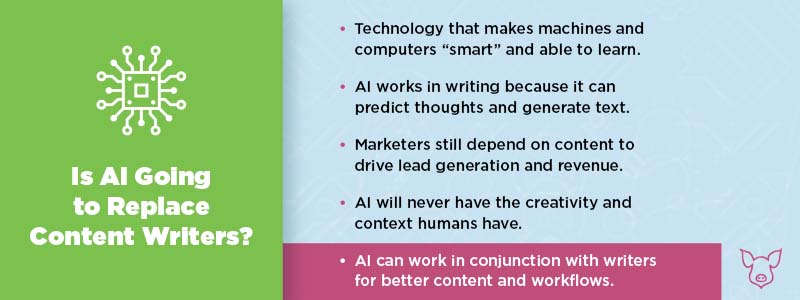AI probably won’t replace writers, but here’s what you need to know about how it is changing the writing world – and how integrating it with human work has benefits.

Technologies driving artificial intelligence (AI) applications continue to advance, meaning that machines are essentially becoming smarter. AI can now take on tasks like coming up with the words and phrases we use to communicate. They can even generate posts and articles for brands to use online.
Human writers are not likely to be replaced anytime soon, though. AI is still not fully able to provide the creativity and nuance of humans to really engage readers. It brings helpful technologies to the table that can work alongside us and improve our workflows, however.
Let’s walk through what AI is, how it works in content, and what it all means for the future of writing.
What is AI and what can it do?
AI is a pretty straightforward concept. Instead of relying on natural intelligence, like that of humans, an AI relies on fabricated intelligence to function. Machines and computers can become smart and solve problems, make decisions, and perform sets of responsive actions. What some people find scary about AI is that it can learn as it goes, becoming smarter based on what it is learning.
Many industries now use AI of some kind. Intelligent machines can speed up manufacturing processes by quickly performing tasks that are time-consuming for humans, for example. Automation – in which tasks like data entry are done automatically – is an important concept within AI.
While AI has replaced certain aspects of jobs that humans once performed, the complete AI-takeover in science fiction has yet to happen.
How AI will affect content writers
AI is already infiltrating the world of writing. Some hope this means content can be produced much faster and that realms like marketing become more efficient and cost-effective.
Text-generating software is one example. This technology utilizes something called natural language processing (NLP) to generate original text to provide coherent information. It tries to mimic human writing by referencing samples and rules. Word processors already use a form of NLP, as it tries to predict what you’re going to say or detect grammar errors.
In 2019, OpenAI developed something called Generative Pre-trained Transformer 2 (GPT2), an open-source AI that can translate and generate text, among other activities. It’s pretty impressive that an AI can write anything from scratch, but the GPT2 can stop making sense and requires human intervention to get right when it tries to write something long.
.jpg?width=1000&name=63.4.4%20(1).jpg)
The future of content writing
The need for great writing isn’t going anywhere anytime soon. Content marketing continues to be a crucial part of business success. According to HubSpot, 70% of marketers actively invest in content marketing, and 78% of companies have one-to-three content specialists on staff. The need for content will only continue to be a priority as people around the globe continue to depend on digital experiences to share information and attract customers. The quality of this content will also keep being important as brands compete for
How humans can be more creative than AI
So, why are we confident that AI won’t take all the content writing jobs? Think about the time you spent writing papers or essays in school. You probably dreaded it for a reason: It’s hard to write something long. It takes research, context, the right voice, and a comprehensive knowledge of a language and all its grammar rules.
While AI is certainly impressive and could handle a lot more than the average human brain, managing all these moving parts to create something witty, creative, or compelling is still a big challenge for it. They lack social and cultural context, for example, so it’s hard for them to implement nuance or humor.
Positive and negative impacts of AI on content writing jobs
Now, there are some positives of AI for writers. Automation technologies that detect errors and predict text can work in conjunction with writers and editors to produce error-free, well-written content. AI can help them speed up processes and get things done faster. This could include automating data entry and other key tasks for completing projects.
One negative impact that AI brings to writing jobs is uncertainty. Writers may worry they’ll be replaced by AI since businesses are always looking to save money on wages. This worry isn’t yet justified, but it still can cause stress. Another risk is depending on it too much. Marketers who start to rely on AI to produce articles and long-form content could easily miss the mistakes or incoherence the AI employed.
The answer is to embrace the benefits that AI brings to content production while recognizing technology just isn’t up to par with human writers. AI and content writers don’t have to be in opposition, but can work together for optimal work.
Get help with content from ContentBacon
Whew! AI isn’t taking over the world anytime soon, but when was the last time you updated your content strategy? ContentBacon can help you revamp your inbound marketing approach to get noticed online, engage your audiences, and boost your revenue.
We have a team of writers, editors, strategists, designers, and marketers who will work closely with you to create and reach your content goals. We customize our services to fit your needs via our monthly subscription plans, so you can scale only when you’re ready.
Reach out to us at ContentBacon to get started with better content.


.jpg?width=1000&name=63.4.4%20(1).jpg)